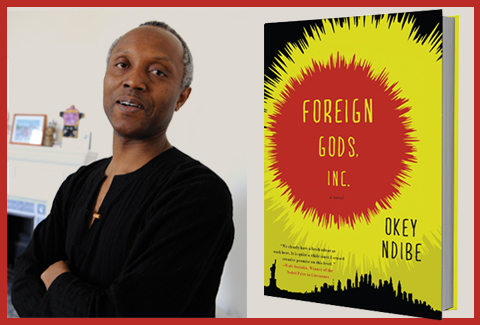
Okey Ndibe has written a novel that wrestles with bad faith and the post-colonial condition in equal measure.
Foreign Gods, Inc., of which Wole Soyinka, winner of the Nobel Prize in Literature said, “We clearly have a fresh talent at work here …” releases this January from Soho Press.
Below is the first in a three-part interview with the author conducted via email.
Paul Oliver: When we meet Ike Uzondu (the protagonist of Foreign Gods, Inc.) he has seemingly hit rock bottom. He’s lost any semblance of control over his addiction to alcohol and gambling. He is mired in a dangerous combination of shame and indignation. It’s enough to bring to mind the famous opening lines of Dostoevksy’s Notes from Underground: “I am a sick man. I am a spiteful man. I am an unattractive man.” What made you want to write such a morally reparable character?
Okey Ndibe: The United States is a truly extraordinary address, a place where – pardon the cliché – dreams are constantly inspired, born and nurtured. But it can also be an unforgiving place, a location where dreams die, where forces, physical as well as ineffable, sometimes appear to be arrayed against the striving, but luckless, guy. Despite the cosmopolitan accent of life in the US, many immigrants also know that the phrase “You have an accent” can suddenly, lastingly take on a certain defining gravity. In many American cities – and this is true, by the way, of the UK as well as much of Europe – you’re bound to run into many immigrant graduates, even PhDs, who are cab drivers, and not always by choice. A sizeable number of these are from Africa, but there are others from Asia, Eastern Europe, South America, etc. In some ways, some of them inhabit the Underground; they have that lacerating sense of being cast, if not quite in a dungeon, then aside. The psychological freight of being caught in that predicament struck me with its rich, complex dramatic potential. My novel attempts to look unflinchingly at some of the monsters that can be birthed when one such “ground-down” man dares – through contemplation of an act of treachery – to become a master of his own fate. At the end of the day, my protagonist, Ike Uzondu, is engaged in a drama of self-reclamation.
PO: At Book Expo last summer you gave me a lesson on how to pronounce Ike’s name—citing how tricky it can be. Correct me if I’m wrong, but it goes something like this: Ike (Eekeh) is short for Ikechukwu, which in Igbo means “The Power of God.” Though if you were to make the mistake of referring to him as EE-kay you’d be saying an entirely different word, ị́kẹ̀, which is the Igbo word for buttocks. I probably have that wrong. But it is kind of fitting for this particular character to be stuck somewhat between those two things. Was that name choice intentional?
ON: You’re exactly right. Unless you’ve spent time getting their pronunciation right, Igbo names as well as words can play tricks on you. For example: the letters a-k-w-a form at least four meanings, each meaning determined by a slight inflection in pronouncement. The same spelling, but the word can mean an egg, a bed, clothing, or tears. So, yes, part of Ike’s sense of depersonalization comes from having his passengers frequently, insouciantly mangle his name. They either call him “Buttocks” or impose the Americanized Ike – as in Eisenhower. I wanted Ikechukwu – Ike, for short – to have that particular frustration and unease.
PO: There are a few strikingly different concepts of personal wealth in this book. Ike’s character alone seems to straddle several views. On one hand he feels guilty for never having sent money back to his family in Nigeria and on the other he is willing to sacrifice his relationship with them for a western concept of wealth. Can you speak to the various ways greed and objectification play out in Foreign Gods, Inc.?
ON: This question strikes at the heart of Ike’s psychological dilemma. It ought to be noted, first, that the tools of social media have homogenized – or, at any rate, rendered globally familiar – certain aspects and trends of contemporary experience. Twenty-five years ago, most Nigerians had little use for the game of basketball; today, many have become hooked, in part because of the sheer scandal – in their eyes – of paying millions of dollars to tall men just for throwing a ball through a basket. As it were, the logic of cash – as much as the dazzle of the dunk and the wizardry of the cross-over dribble – has made basketball compelling. As a Fulbright lecturer at the University of Lagos, I noticed that my students, who had never even visited a neighboring African country, much less New York City, Nashville, or Atlanta, could do unheard of things with American slang. But Ike is not searching to be an over-“social mediated” man. In fact, even though the novel is set about 2005, he’s far from taken with cell phones, which he sees, dimly and primarily, in terms of their intrusive capacity. Yet, like many an immigrant, he’s compelled to simultaneously play by the rules of two cultural games. He’s buffeted by personal crises, some of them of his own making, but he can’t help responding to his mother’s claims on his financial support. He’s fond of his uncle, the chief priest of Ngene, his community’s war deity. Even so, he somehow subordinates a great love for his uncle to an all-consuming craving for riches. Ultimately, it’s this desire to rig himself into “American-made” material success that both propels and blinds him.
* * *
Be sure to check back for part II in this interview series tomorrow. Meanwhile, you can read more about Okey Ndibe’s Foreign Gods, Inc., here.